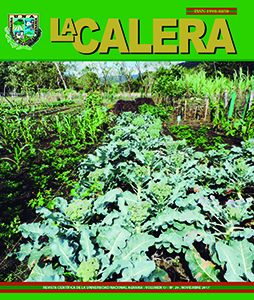Practices and processes of research and extension found at the curriculum of agronomy school, Universidad Nacional Agraria
DOI:
https://doi.org/10.5377/calera.v17i29.6530Keywords:
competitions, investigation, curricular axis, linkage teaching-research-extension, educational innovation, learning for lifeAbstract
An effective link between teaching, research, and extension is a necessity in the professional training of Universidad Nacional Agraria. In the period from July to November 2014, a study was carried out with the purpose of gather information about curricular and extracurricular practices and actions of research and extension present at the curriculum of Agronomy Faculty, Universidad Nacional Agraria. The research was quantitative, not experimental. The information was collected using documentary review and surveys. Questionnaire were applied to teachers and students of the last two years at the Faculty of Agronomy. The results show that at FAGRO the most widespread mechanisms to enhance capabilities in research and extension are scientific university journeys, emerging plans, and pre-professional practices. Students do not know about some of the practices that encourage research and extension, such as teaching assistant and entrepreneurs, however, they are identified with scientific conferences and pre-professional practices. The FAGRO curriculum should include formative research plans, movements of entrepreneurs, internships and scientific conferences, high-achieving students, and encouraging from the early years of the careers extracurricular practices that allow greater scope of research and extension. Curricular activities of greater impact in research training and extension are fi eld trips and crop establishment, and needs to emphasize in laboratory practice and direct coexistence with the farm family. The adjustment to the study plan of the agronomy faculty will allow research and extension permeate the curriculum, thereby achieving creative, analytical students, who become agents of change for Nicaraguan society
Downloads
1112

